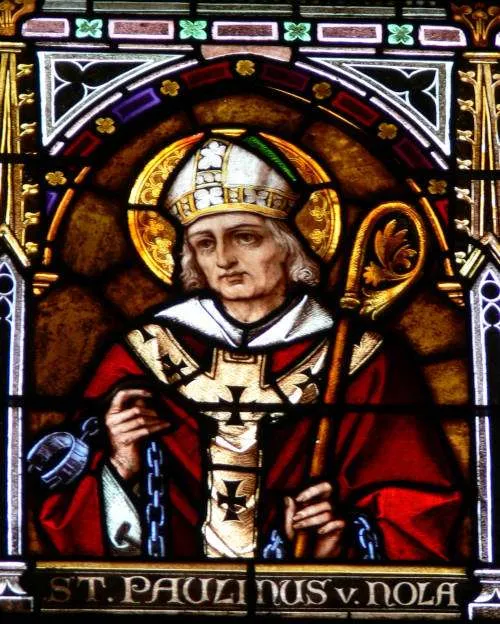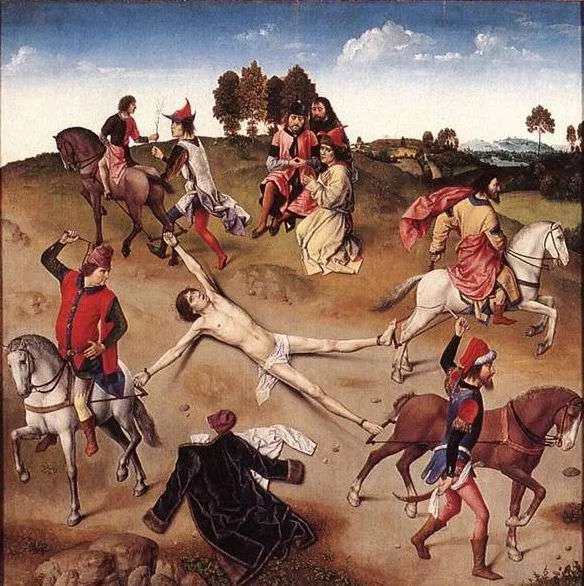c. 354–431; Patron Saint of bellmakers; Invoked by the people of Nola, Italy; Pre-Congregation canonization
Pontius Meropius Anicius Paulinus, more simply known as Paulinus, was born in Bordeaux, modern-day France, into a noble senatorial family. Bordeaux, then part of the Roman Empire, was a major center for learning, culture, and trade. As a member of the nobility, Paulinus would have received an excellent education in preparation for a career in civil service. Among his teachers was the famous poet Ausonius, under whom he studied literature and rhetoric. Around the age of twenty-three, his career entered full swing when the Roman Emperor, Gratian, appointed him as a suffect consul at Rome, a position held in high esteem among the ruling class. A few years later, the emperor appointed him as governor of Campania, a region that included Naples and many surrounding cities, including Nola.
Though less important than many other cities when he was governor, Nola caught Paulinus’ attention because the townspeople had a great reverence for the third-century martyr Saint Felix who was buried there. Saint Felix was a priest likely martyred during the persecution of either Decius or Valerian between 251–260. Inspired by the locals’ devotion to Saint Felix, Paulinus built a road to make it easier for pilgrims to travel to his tomb, as well as a hospice where they could stay. Although Paulinus held an important position of power as governor, the faith and devotion that the people had for Saint Felix stirred in him a desire for something greater, leading him to inquire into the Catholic faith.
After the assassination of Roman Emperor Gratian in 383, Paulinus moved to Milan to study the Catholic faith, most likely under Saint Ambrose. He then returned home to Bordeaux where he continued his studies, was baptized by the bishop, and married Therasia, a noblewoman from Barcelona. Therasia’s strong faith greatly influenced Paulinus, helping him to grow closer to Christ and embrace a more radical life of prayer and asceticism. Not long after their marriage, Therasia gave birth to a son, but the child died within a week. This profound event, instead of leading them to anger or despair, prompted Paulinus and Therasia to deepen their devotion and trust in God. They felt God calling them to a more intense life of prayer and asceticism. Consequently, they sold most of their possessions, donated the money to the poor, and mutually agreed to live in abstinence as husband and wife.
While in Barcelona, Paulinus’ faith and good works became so well known that he was asked to become a priest. His ordination either took place in Barcelona or back in Campania, where Paulinus had been governor and where he first discovered the Catholic faith. In Campania, Paulinus and Therasia settled in Nola, Saint Felix’s burial site, since Paulinus attributed his conversion to Saint Felix.
In Nola, Paulinus and his wife began to spread the faith by embracing a new form of monastic life that they shared and invited others to join. They spread devotion to Saint Felix by constructing a monastic center for pilgrims, places of worship, and infrastructure to help with basic needs. They were very generous to the poor, even though they themselves chose to live in poverty. After Therasia died, Paulinus was chosen as bishop of Nola around 409, when he was about fifty-six years old. He would carry out this responsibility until his death, twenty-two years later.
As bishop of Nola, Paulinus continued to spread the Gospel and serve the poor with great generosity. He also used his education in poetry to write many faith-based poems and hymns. Though he was praised by many, some questioned the wisdom of his Christian vocation. His former teacher, the great poet Ausonius, saw his poverty and generosity toward the poor as irrational, and his abandonment of pagan poetry as an abandonment of poetry itself. However, Bishop Paulinus’ love for the poor was a much deeper realization of the value of material possessions and their purpose. As for his training in poetry, Bishop Paulinus used those natural talents for a much higher calling, putting them at the service of the Gospel.
Bishop Paulinus wrote many letters, some of which still exist. Most notably, he was in written communication with the great Saint Augustine of Hippo, who even mentioned Paulinus in his Christian classic, The City of God. Additionally, Paulinus corresponded with Saint Martin of Tours, Saint Jerome, and many others. Regarding Paulinus’s writings, Pope Benedict XVI said, “Saint Paulinus did not write theological treatises, but his poems and ample correspondence are rich in a lived theology, woven from God’s Word, constantly examined as a light for life. The sense of the Church as a mystery of unity emerges in particular from them. Paulinus lived communion above all through a pronounced practice of spiritual friendship. He was truly a master in this, making his life a crossroads of elect spirits…”
Saint Paulinus began his life with wealth, noble status, and civil power. When he saw the devotion that the faithful had toward Saint Felix, he realized there was more to life than the pursuits that had occupied him. When his wife and he tragically experienced the loss of their child, they didn’t turn to self-pity or anger. The couple used their loss as an opportunity to more fully abandon themselves to the will of God. When Paulinus’ wife died, he devoted himself even more fully to the service of God and His Church through his episcopal ministry and generosity to the poor and the pilgrims. He used his natural talents for the glory of God through his hymns, poetry, and extensive correspondence with others, and inspired others to join him in a life of prayer and asceticism.
As we honor Saint Paulinus today, ponder your own journey of faith. Looking back at life, especially at any challenges you have faced, have you allowed God’s grace to strengthen you through those challenges, or have you turned away as a result? Allow Saint Paulinus to inspire you on your journey, using every challenge and every natural gift for the sole purpose of glorifying God and fulfilling His perfect will.
Source: https://mycatholic.life/saints/saints-of-the-liturgical-year/june-22—saint-paulinus-of-nola-bishop/







